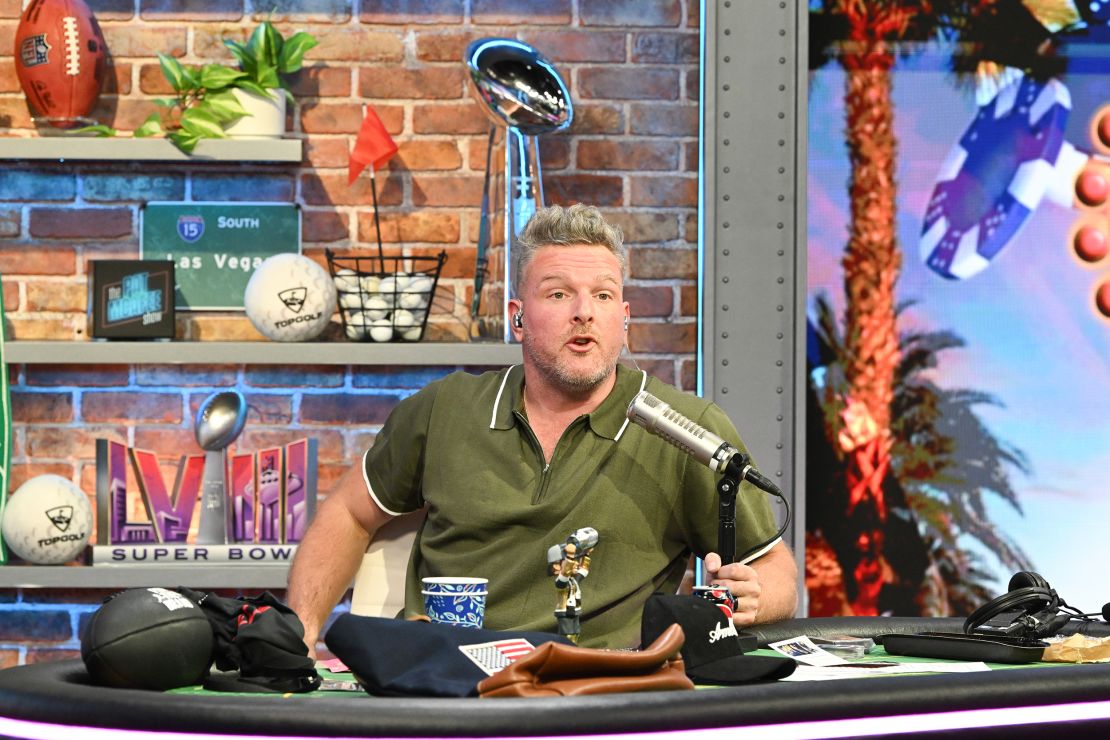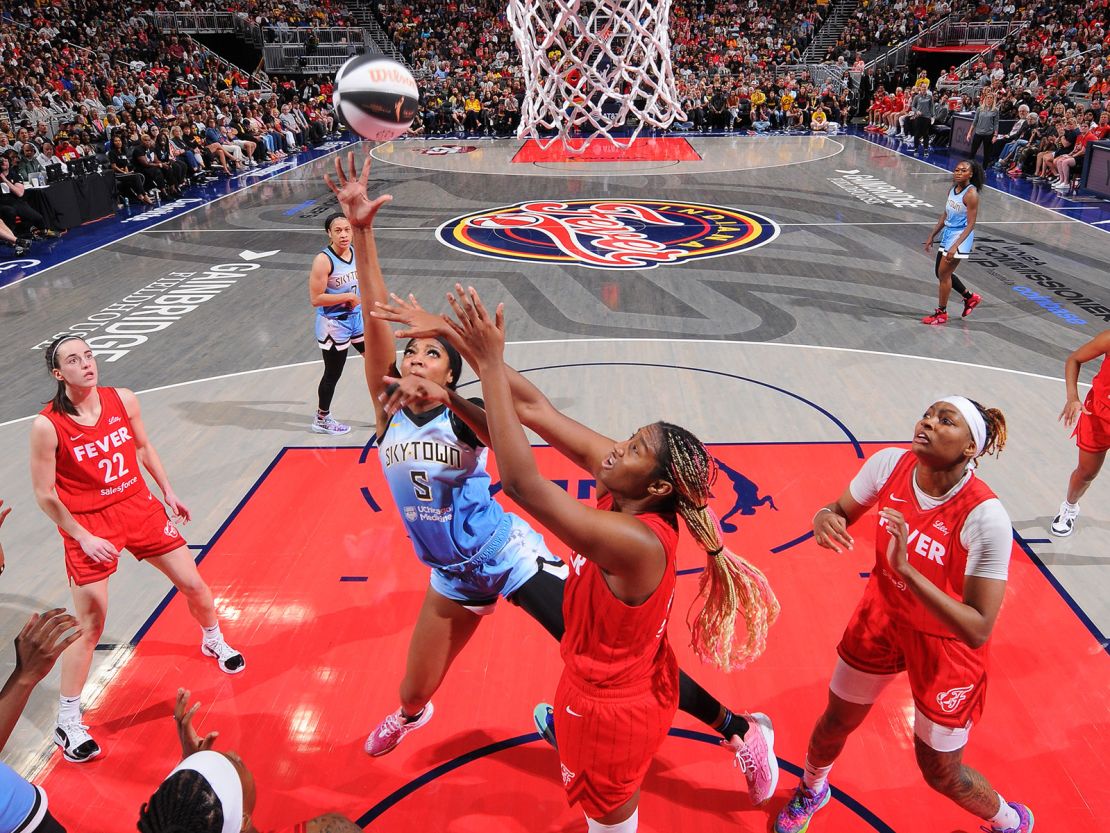Editor’s Note: Amy Bass (@bassab1) is professor of sport studies at?Manhattanville University?and the author of “One Goal: A Coach, a Team, and the Game That Brought a Divided Town Together” and “Not the Triumph but the Struggle: The 1968 Olympics and the Making of the Black Athlete,” among other titles. The views expressed here are solely hers. Read more?opinion?on CNN.
Folks want someone ejected, benched, banned or fined for WNBA rookie Caitlin Clark going down hard in the Indiana Fever’s?71-70 win?over the Chicago Sky the other night? Maybe start with ESPN personality?Pat McAfee.

That game was one a lot of folks had been waiting for, positioned as a showdown between former college rivals Clark (formerly of Iowa) and Angel Reese (LSU), facing off for the first time on the professional stage. But Chennedy Carter’s?smackdown?of Clark — charged as a personal foul and later elevated to flagrant — took center stage, fodder for water cooler conversations and arguments regarding whether or not Clark is being unfairly targeted and, if so, whether the WNBA should be doing something about it.
“I think at this point I know I’m going to take a couple of hard shots a game and that’s what it is,” Clark said of being targeted. “I’m trying not to let it bother me.”
McAfee, however, was more than delighted to join the fray. In the midst of one his shock-jock style presentations on his eponymous show on Monday, he?described Clark — who he appeared to be defending and supporting as the reason so many people are interested in the WNBA — as the “one white?b*tch for the Indiana team who is a superstar.”
Does McAfee live?to get a rise out of people??Absolutely. Does he know that word “b*tch” goes beyond that? Also, absolutely.
The response to McAfee’s very own Don Imus moment brought an apology mere hours later, although he still insisted that he was, in the end, right. “I shouldn’t have used ‘white b*tch’?as a descriptor of Caitlin Clark,”?he wrote on X?(formerly Twitter). No matter the context…even if we’re talking about race being a reason for some of the stuff happening…I have way too much respect for her and women to put that into the universe.”

But he didn’t stop there. “My intentions when saying it were complimentary just like the entire segment but, a lot of folks are saying that it certainly wasn’t at all. That’s 100% on me and for that I apologize… I have sent an apology to Caitlin as well. Everything else I said… still?all facts.”
Tuesday morning, he tried again.?“I legitimately meant it in a complimentary fashion – like this is (Clark), this is the one….I honestly had no idea what was happening on the internet until 2.5 hours later, after the show ended,” he said.?“Then…I felt like actually the worst human on earth for a good portion of my travels….Those were not my intentions, but that’s how you took it. That’s on me. I do apologize.”
But the damage has been done. The word doesn’t care if it is couched within a complimentary rant.?It is a dehumanizing, gendered term of disparagement with no equal on the men’s side — and every man who uses it knows it. Women have, to be sure, reclaimed the word in numerous ways, including?“Bitch”?magazine. But that doesn’t mean men, including you, Mr. McAfee, have a green light, no matter how normalized the word might seem.
Let’s be clear: The WNBA isn’t new. A professional sport league shouldn’t be in its 28th?season and still have this kind of flare up, with professional sports commentators, even the fringe ones, seemingly unable to know how to talk about it and its players.
But now, largely because of Clark, there are a lot of new eyes watching it, new mouths chattering about it. And those and eyes and mouths belong to a lot of folks who have no idea what they’re talking about — including, perhaps especially, the physicality of professional women’s basketball.
Even before Clark got to the WNBA, many so-called sport pundits had a hard time processing her place in the sport. Besting LSU legend Pete Maravich’s?scoring record, of course, brought out legions of Pistol Pete fans who needed to defend their hero, contextualizing Clark’s record with a grain of salt because Maravich played fewer games, didn’t contend with a shot clock and didn’t have the luxury of a three-point shot.
Such fans usually left out that he played in a segregated league.
Coming off the rush —?and ratings bonanza —?that was the 2024 NCAA tournament, sports commentators had a problem, it seemed, learning how to talk about all these teams they suddenly cared about. Bill Simmons and Ethan Strauss?fretted?over the fact the WNBA teams didn’t have the same names as their NBA counterparts. How on earth would they be able to add 12 team names — teams that have been around for quite a while, mind you — to their rosters of knowledge?
“Like, why force people to learn about the Fever?” Strauss asked. “Why not just have the ‘W Pacers’?”
These are professional sportscasters. And yet they, too — perhaps especially — seem unable to extract the women’s side of a sport from the men’s. Just because the names of the teams in the WNBA are new to you doesn’t mean they are actually new. Just ask?Gregg Doyel, who became a shining example of what happens when a seasoned professional sport journalist suddenly forgets how to behave at a press conference, his awkward (and that’s being kind) exchange with Clark during her first post-draft interview bad enough; his apparent inability to understand what he did wrong even worse.

The members of the editorial board of the Chicago Tribune, of course, are not a set of seasoned sports journalists. But weigh in they did, clumsily sloshing around the world of sport in a feeble — and baffling —?editorial?that supported Clark and?likened Carter’s takedown of her to “assault.”
“The foul committed by … Carter was egregious,” wrote the team’s hometown paper. “Outside of a sporting contest, it would have been seen as an assault …. She should have been ejected from the game.”
Where were these writers when?Alyssa Thomas clotheslined Angel Reese?in the third quarter of the Sun’s win over the Sky, which after a review by the officials sent Thomas off the court — a flagrant foul 2.
“They’re not supposed to be nice to me,”?Reese said of the hit. “I hope you all know that. They’re not supposed to be nice to me or lay down because I’m Angel Reese or because I’m a rookie.”
The Tribune editorial claimed that Clark “hasn’t done anything to deserve the treatment she’s been receiving.” Except she has. She’s good. Really, really good. A generational talent. A player who nailed down multimillion-dollar endorsement deals before setting foot on the professional court. She has, without question, inarguably, raised the level of hype around the WNBA in unprecedented fashion, seemingly carrying the weight of the league on her shoulders.
Get Our Free Weekly Newsletter
- Sign up for CNN Opinion’s newsletter
- Join us on Twitter and Facebook
But this isn’t T-ball or pee-wee soccer. No one is getting a participation medal and an ice cream cone. This is a league of giants — from Breanna Stewart to A’ja Wilson. Has this editorial board,?which?really should’ve?checked in?with the paper’s own beat writers before wading into these waters, ever?seen?a Blackhawks game? Or the Bears??Off the ice, off the gridiron, checking and tackling, too, could be seen as assault.
Except they aren’t. Because there’s a lot of things done in sport that aren’t part of everyday life, including dressing the same as all of our coworkers, pushing people out of our way to get to something we want or assuming that a pair of puffy gloves make it fair game for us to slug anyone else wearing puffy gloves. If the WNBA’s time has come — and to say that it is long overdue is quite the understatement — then those who want to commentate and speculate need to do better.
Bench the naysayers and the know-nothings. Let the women hoop.

